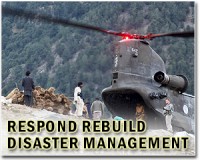| . |  |
. |
Kamaishi, Japan (AFP) March 20, 2011 Isolated reports of looting by desperate tsunami survivors have emerged in Japan, whose people have been widely applauded for their discipline in the face of appalling adversity. Other countries have noted with admiration, and some envy, the almost total absence of social disorder following the massive March 11 earthquake and ensuing tsunami that has left nearly 20,000 people dead or missing. In stark contrast to the chaos and violence that followed last year's quake in Haiti or Hurricane Katrina in New Orleans in 2005, the response to Japan's worst natural disaster since 1923 has been a showcase for the restraint and resilience of one of the world's most stable societies. Despite chronic food and water shortages in the worst-affected areas, even abandoned vending machines went untouched, their edible contents still sitting behind their transparent fronts. But now, more than a week after the tsunami hit, police say some incidents of looting and theft are being reported from battered and abandoned homes and stores. The phenomenon is rare in Japan, a country where police crack down hard on petty crime and residents are rewarded with a finder's fee for returning lost or stolen items. Tales of misplaced wallets being returned are legendary. "Since we have been so busy with the search and rescue operations and then the clean-up, it's hard for us to be aware of everyone who is looting," said Hironori Kodashima, vice-chief of police in the small, badly hit fishing port of Kamaishi in northeastern Iwate prefecture. "We have just begun receiving reports about this and making arrests. But we are concerned about it and want it stopped," he said, citing the case of a man arrested as he was trying to prise open an ATM machine. "Generally speaking, people are looting due to lack of food and money. Thieves break in and loot homes because they have been abandoned and nobody is living there any more," he said. Others were less generous in their assessment, insisting that an increasing number of people were coming to the devastated northeast coast with a view to profiting from the chaos and destruction. Masayuki Sasaki, 42, lost his mother to the tsunami that almost obliterated the town of Rikuzentakata, some 50 kilometres (30 miles) south of Kamaishi. He and his widower father returned to the flattened remains of their home to try and salvage anything useful or personal. But, Sasaki complained, survivors and rescuers were not the only ones hunting around. "I can cope with living in the refugee centre and all that, but what I really can't stand is the thieves who come here," he said. "They pretend to be helping, but they're looking for money, or maybe for bank books. I have lost everything and they come here looking for money. It's disgusting." The vast majority of Japanese have remained calm and stoical, putting up with difficult conditions at evacuation shelters and waiting patiently in line for hours at gas stations and outside supermarkets running low on supplies. And what theft has taken place has generally been low-level, including cases of people siphoning fuel out of abandoned vehicles. Nevertheless, some people have still been appalled that any crimes have been committed at all at a time when people are trying to pull together -- and in a usually safe country where such behaviour is not common. "Is it safe now? No, in fact you can't say it's safe," said Ayako Ito, 84, whose mountainside home overlooking Kamaishi was high enough to be spared the ravages of the tsunami. "People who see the thieves scream 'Stop it, stop it!' It's best to not go far from your house because our belongings are inside," said Ito, who had only eaten one rice ball all day and said she was suffering from the cold at night with no power or electricity. Masuya Misato, 33, a volunteer worker in Kamaishi, said he had witnessed several cases of smash-and-grab raids. "They steal items from stores and cash from the destroyed houses. They also steal beer and cigarettes," Misato said. "There are cars everywhere that were swept away by the tsunami, and since they have been abandoned, they steal gas," he added. "It's shocking and I hope it stops soon."
Share This Article With Planet Earth
Related Links Bringing Order To A World Of Disasters A world of storm and tempest When the Earth Quakes
 Man rescued from rubble eight days after Japan quake
Man rescued from rubble eight days after Japan quakeOsaka, Japan (AFP) March 19, 2011 Rescuers pulled a man from the rubble of a destroyed building in northeast Japan on Saturday, eight days after a massive earthquake and tsunami, a Self Defence Forces spokesman said. Troops "recovered a young man from a half-destroyed house in Kesennuma city (Miyagi prefecture). He has no visible injuries but he was in such shock that he was unable to speak," said spokesman Hiroyuki Nakayama ... read more |
|
| The content herein, unless otherwise known to be public domain, are Copyright 1995-2010 - SpaceDaily. AFP and UPI Wire Stories are copyright Agence France-Presse and United Press International. ESA Portal Reports are copyright European Space Agency. All NASA sourced material is public domain. Additional copyrights may apply in whole or part to other bona fide parties. Advertising does not imply endorsement,agreement or approval of any opinions, statements or information provided by SpaceDaily on any Web page published or hosted by SpaceDaily. Privacy Statement |